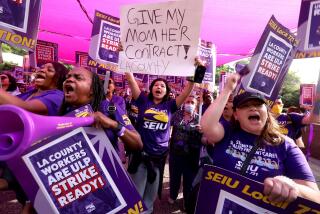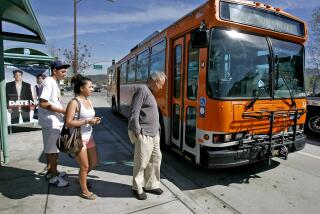Transit Strike Threat Grips Philadelphia
PHILADELPHIA â The city made preparations Saturday for a possible transit strike as the regionâs main transportation agency and its largest labor union faced off in a stalemate over wages and health benefits.
If no deal is reached by 12:01 a.m. Monday, the cityâs subway, trolley and bus workers will walk off the job, said Jeff Brooks, the president of Transport Workers Union Local 234.
City Controller Jonathan Saidel tried Saturday to break the logjam over health benefits -- one of the most contentious issues -- by proposing a sliding-scale health plan. Brooks said he would consider it.
âWe should base payments on what people earn,â Saidel said. âThose who make more will pay more.â
In addition to Brooksâ union, which represents about 5,000 city transit workers, about 300 suburban transit workers represented by United Transportation Union Local 1594 plan to strike at the same time.
The Southeastern Pennsylvania Transportation Authorityâs commuter rail system has a different union contract and would continue to operate. But the city and suburban transportation that would shut down during a strike have a much higher ridership and are vital to mobility in a city where one in three households lacks a car.
City preparations for a possible walkout included setting up extra bicycle racks and allowing more parking on city streets. City schools, which donât provide bus service for high school students, plan to remain open but could reconsider if there is a prolonged strike.
The last Philadelphia transit strike, in 1998, lasted 40 days.
Patrick Battel, SEPTAâs chief negotiator, said he expected to meet with Brooks again during the weekend.
Union officials walked out of the negotiations on Friday. Brooks said the talks had gone âdramatically backwards.â
About 460,000 people use the lines that would shut down, compared with about 50,000 for SEPTA commuter rail.
The contract between SEPTA and Local 234 was extended three times before expiring June 15.
Other transit agencies in the region would not be affected by a strike. They include the PATCO Speedline, which has four subway stations in downtown Philadelphia and nine stations in New Jersey; New Jersey Transit, which runs buses and trains between Philadelphia and various points in New Jersey; and Amtrak.
More to Read
Sign up for Essential California
The most important California stories and recommendations in your inbox every morning.
You may occasionally receive promotional content from the Los Angeles Times.










